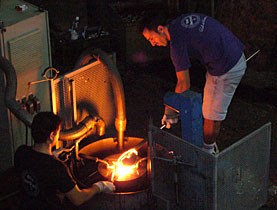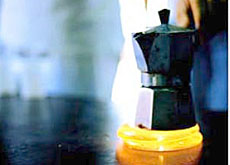Glass from the Glasi keeps a tradition alive

Switzerland's only glassworks has built up a remarkable reputation in the 20 years since Robert Niederer took over the factory from his father Roberto.
The proof is that almost three out of four people recognise the name and praise the quality of the small company’s products, according to a survey carried out on the image of Swiss firms.
The factory – affectionately called the Glasi – has been making glass in the village of Hergiswil near Lucerne in central Switzerland since 1817 but it’s only in recent years that the place has really come alive.
Niederer has made a visit to the place an unforgettable experience. For example, the Glasi features a museum on the history of the factory, with a surprise twist at the end.
You are guided on to a balcony above the very heart of the action where the glassblowers are at work in front of the oven. The heat and the sight of glass being produced in front of your eyes bring the Glasi to life.
“I try to bring a lot of people here to show them how we produce the glass. I think this is the only way we can survive,” Niederer told swissinfo.
“We have around 200,000 people come every year and it’s clear that if they are fascinated they also spend money. They buy our glass and we live from this.”
About half of annual sales are made in the two factory outlets – one selling seconds – with the other half sold to shops around Switzerland.
Other attractions
But there are other attractions that make the Glasi stick out. There are a number of exhibitions, featuring what you can do with glass and light, as well as glass and sound.
Another plus is that that the factory is on the shores of Lake Lucerne and has its own park with panoramic views of the local mountains.
While Niederer describes the Glasi now as a “really healthy company” it wasn’t always that way. The Siegwart family, which had run the works since they opened, wanted to close it in 1975 because it was losing money.
This is when Roberto Niederer, a client of the Hergiswil factory, stepped in.
“He could not live with the idea of closing “his” factory so he did all he could to take it over. My father never had money because he always spent it for his projects in glass but he had a lot of friends and he also found politicians who helped him,” son Robert said.
Handicraft
Niederer the elder lost no time in throwing out all the machines that made glass and putting the workers and their handicraft to the fore.
“He was always near the oven with his glass blowers. That’s the big difference between him and me. I’m more in the office organising things, whereas for him it was more important to work with the glass. He was the artist,” the son said.
Niederer was taught the secrets of glass by his father, although under some duress because he didn’t find it that fascinating at the time.
“Today I must say I’m happy that I know how to make it. It helps me a lot.”
The two Niederers didn’t work together as a team, mainly because the son wanted to avoid any family fights, but the two were never that far apart from each other.
“Patriarch”
“My father was really a very strong person, a patriarch. There was no place besides him. And I always said: ‘Father, I will come when you are no longer here. As long as you are in this factory there is no place for me.”
On May 1, 1988, son Robert went to visit his sick father in Calabria, taking with him a contract.
Step by step, he’s built up the Glasi to an attraction known throughout Switzerland and around the world thanks to tourists.
Niederer says it’s not difficult to keep the factory going because he puts his heart and soul into it.
“I live just next to the factory here and if I’m asked what I do in my free time, I say I do nothing. I’m always here.
“I don’t work 24 hours a day but my heart is always here. I think if you earn money and put it back into the factory, it improves step by step,” he said.
No lead
Another part of the philosophy of the place is that Niederer does not produce glass with lead, arguing that he does not want to endanger the health of his workers.
In short, he says the glass comes out like honey from the oven and is turned into “just a normal, nice glass that we can also call crystal glass without lead”.
The Glasi has good orders so Niederer does not think much has to change.
In the near future he will be grooming his son Roberto, who is 20 this year, to take over the company and continue making glass in Hergiswil. But does he want to?
“He tells me: ‘Papi, I’m not stupid, of course I’ll take it’.”
swissinfo, Robert Brookes in Hergiswil
Most of the glass blowers in Hergiswil come from Portugal. There are now no Swiss.
“If a Swiss can blow glass, he’s an artist and we don’t need artists; we need workers here in our factory,” Niederer said.
Many glassworks in Europe have closed due to a lack of ideas and because they produced only low-cost glass.
“We are the last glass factory in Switzerland and that hurts a little bit. I would like to have competition.”
The oven at the factory is on 24 hours a day 365 days a year. The temperature inside is 1,500 degrees Celsius.
A total of 4,000 kg of glass is taken out daily in two eight-hour shifts. One employee works overnight putting in new sand.
Apart from the sand, which comes from either Belgium or Germany, a mixture of about 15 other minerals are put inside.
Once the glass comes out of the oven and is shaped, it goes into another oven so that the cooling process is slow. If it were simply left at room temperature the glass would break.

In compliance with the JTI standards
More: SWI swissinfo.ch certified by the Journalism Trust Initiative



You can find an overview of ongoing debates with our journalists here. Please join us!
If you want to start a conversation about a topic raised in this article or want to report factual errors, email us at english@swissinfo.ch.